|
 Secure Site
Secure Site
|
 |
Archive for the 'Sleep Habits' Category
 Morning meditation Sense the Stillness in the Morning
For yoga instructor Alison Novie, mornings make an ideal time for meditation — perhaps more than any other time of day. “The sun’s about to rise, but it’s still sort of dark and quiet,” says Novie, who wakes at 5:00 a.m. to meditate. “I get up, brush my teeth, light a candle, and then sit for half an hour. The calm energy I get from that morning meditation carries me through the day.”
You don’t have to be a regular yoga or meditation practitioner to reap the benefits of a morning meditation ritual. Start with five minutes daily, using the guidelines that follow. Set you Meditation Timer from Now & Zen for 5 minutes. Then over the course of a few weeks — or when you are ready — gradually work up to 10 minutes. Remember, with meditation it’s quality, not quantity, that matters.
Start with awareness. Rather than lunge out of bed, Novie suggests waking up slowly. “Spend a few minutes just becoming conscious of the sensations of your body. Awareness is such a beautiful way of entering your day.” Once you’re up, resist the temptation to check your e-mail, flip on the radio, or do any of the other countless things that draw you out of yourself and into the concerns of the world. Instead, keep the focus inward.
Find a comfortable spot. Practice your five minutes of meditation anywhere you like (the bedroom floor, a favorite chair) except the bed, where you may fall back to sleep. To enhance the sacred aspect of her meditation space, Novie set up a small altar in her living room that she uses only for meditation, giving the space a positive energy of its own. Be sure to set your Meditation Timer from Now & Zen for 5 minutes.
Sense your breath. Close your eyes. Feel your breath moving in and out of your body without controlling it. Bring your attention to the rise and fall of your abdomen or to the tip of your nose. The more awareness you bring to breath and body, the more grounded in your body you’ll become. This, in turn, will help relieve some of the stress that comes with getting through your morning.
Don’t try to block your thoughts. Your mind will wander — that’s what it’s designed to do. Rather than try to fight off thoughts as they emerge, acknowledge them, but don’t engage them. And give yourself some slack — meditation is, after all, a practice, not perfection.
Our Zen Timepiece’s acoustic 6-inch brass bowl-gong clock is the world’s ultimate alarm clock, practice timer, and “mindfulness bell.”
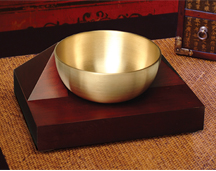 Meditation Gong Timer with Singing Bowl It fills your environment with beautifully complex tones whenever it strikes. In the morning, its exquisite sounds summon your consciousness into awakening with a series of subtle gongs that provide an elegant beginning to your day. Once you experience the Zen Timepiece’s progressive awakening, you’ll never want to wake up any other way. It also serves as the perfect meditation timer.
adapted from Body + Soul, March 2006
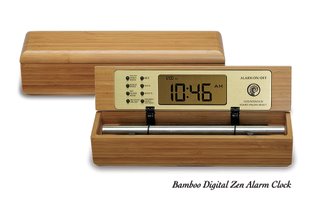
Now & Zen’s Clock Shop
1638 Pearl Street
Boulder, CO 80302
(800) 779-6383
Posted in Bamboo Chime Clocks, Chime Alarm Clocks, intention, Natural Awakening, Now & Zen Alarm Clocks, sleep, Sleep Habits
 Sanmonji, Sleeping Cat 1992, woodblock print Sleep is an essential bodily function, like eating and breathing. But more and more, we minimize its importance, and the health effects can be devastating. Besides affecting how we feel and function day to day, a chronic lack of sleep have harmful effects on our emotional and spiritual well-being.
Besides allowing our bodies and brains to refuel, sleep allows for our souls to recharge.
Here are two relaxation techniques to use as you wind-down in the evening:
Use a mind-body technique. Doing a bedtime relaxation exercise, such as the following, can help you fall asleep or get better, deeper sleep. Paced breathing, inhale through your nose for a count of four. Hold for a count of seven. Exhale through your mouth for a count of eight. As you breathe, rest the tip of your tongue on the ridge behind your front teeth. When you exhale, it should create a shooshing sound. Repeat four times.
Mental Muscle Relaxation
Lying down or sitting comfortably, close your eyes and take a few deep breaths. Starting at the top of your head, notice whether there’s tension in your scalp and forehead. If there is, let it go. Progress all the way down your body, assessing each muscle group and mentally releasing any tension.
Our Zen Timepiece’s acoustic 6-inch brass bowl-gong clock is the world’s ultimate alarm clock, practice timer, and “mindfulness bell.” It awaken you with the beautiful tones of a singing-bowl, used by many sound therapist.
It fills your environment with beautifully complex tones whenever it strikes. In the morning, its exquisite sounds summon your consciousness into awakening with a series of subtle gongs that provide an elegant beginning to your day. Once you experience the Zen Timepiece‘s progressive awakening, you’ll never want to wake up any other way. It also serves as the perfect meditation timer. Available in 5 wood styles, including bamboo. Remember to set your Zen Alarm Clock with the 10 minute programmed chime sequence to awken you in the morning relaxed and refreshed.
adapted from Body + Soul, November 2009 by Tracy Gaudet, M.D.
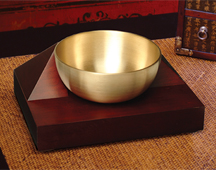 Singing Bowl Alarm Clock with Natural Sounds to Awaken You Now & Zen – The Gradual Alarm Clock Store
1638 Pearl Street
Boulder, CO 80302
Posted in Japanese Inspired Zen Clocks, Natural Awakening, Now & Zen Alarm Clocks, Progressive Awakening, Sleep Habits
 Painting of Morpheus, Phantasos and Iris by baron Guérin - Morpheus God of Dreams & Sleep So much has been written about sleep, you’d think we’d all be wrapped in the arms of the slumber god Morpheus by now, dreaming sweet dreams and waking up refreshed. But for too many Americans a sound sleep remains, well, a dream. Instead they spend their nights tossing and turning and their days walking around bleary-eyed and exhausted.
You won’t sleep well if you don’t feel comfortable in your surroundings. This is why you should devote time to preparing the best possible sleep environment. Feng shui, the ancient Chinese art of placement and design, promotes bedrooms that are clutter-free and decorated with colors that engender feelings of serenity.
First, create a boundary around your bedroom, says feng shui expert Terah Kathryn Collins, author of The Western Guide to Feng Shui: Room by Room (Hay House, 1999). “The bedroom should be reserved for two things: sleep and romance,” she explains. Next, eliminate anything that increases activity or stimulates the mind such as TVs, computers and exercise equipment. “If you see your computer, you’ll think of emails you haven’t returned. Your treadmill will remind you that you need to work out more,” Collins says. If you must have a TV in the bedroom, place it in a cabinet with doors, so it can be out of sight when not in use. Hide any other must-haves behind an attractive, free-standing screen.
 Feng Shui, bed placement promotes relaxation Also, place your bed so you can see the door. “If the door is hidden from view, that increases anxiety,” Collins says. It also shouldn’t be directly in front of the door, but rather off to one side so that you don’t have the sense you can be easily intruded upon. The direction the bed points is also important. Collins says insomniacs should face the headboard west, which promotes relaxation and helps them to sleep past dawn. If your insomnia is depression-related, however, she suggests facing the headboard toward the east, which “speeds people up.” Sleeping with your head pointing north maintains overall balance, while south promotes intuition and dream recall.
 Ohara Koson (Shoson) 1877-1945 two carp and white lotus 1933 Colors can also affect your slumber. It’s best not to have gray, blue or pure white as the dominant color, Collins says, for the simple reason that “cool colors such as these don’t complement or ‘match’ your skin.” The problem? “Though they can be dramatic, they don’t make most people feel truly comfortable and relaxed.” Try this experiment: Find a pure white sheet and one in a skin-tone color such as beige, and hold them up to your face in front of a mirror. “Most people will notice that the skin-tone is more attractive against their skin, while the cool contrast of the white can make them look washed out and sallow,” Collins says. So choose pastel colors reminiscent of skin tones and/or the deep rich hues that come from skin tones, such as beige, chocolate brown, peach and terracotta.
Finally, make your bedroom a clutter-free zone. Remove piles of clothes and reduce that bedside stack of magazines and books to just one of each. “The more stimuli you can eliminate, the better,” she says. Collins adds that while mirrors can make rooms feel bigger and brighter, they also can be a distraction at night because reflections can be quite activating. Her suggestion: Place curtains over mirrored closet doors so they can be “closed” at night and opened during the day.
One of the ultimate Zen like experiences is waking-up from a great slumber refreshed and energized. Your mind and body are harmoniously one, both alert and focused. Having a refreshed mind and body are two keys to a natural and Zen lifestyle. Waking up in the morning should not be a loud and abrupt awakening, but rather it should be a peaceful positive experience. The right natural alarm clock can transition your deep and tranquil sleep into a serene start to consciousness. Imagine a long-resonating Tibetan bell-like chime waking you up to a beautiful morning experience.
The right alarm clock can be the most beneficial investment for you. With our Now & Zen natural alarm clock you are awakened more gradually and thus more naturally. Now & Zen is focused on creating a naturalistic lifestyle, and our clocks are an example of our philosophy.
adapted from Natural Solutions, December 2005 by Matthew Solan
 Zen Chime Alarm Clock, Digital Black Lacquer Chime Clock, clocks to make your bedroom a 'clutter-free' zone Now & Zen – The Gradual Chime Alarm Clock Store
1638 Pearl Street
Boulder, CO 80302
(800) 779-6383
Posted in Bamboo Chime Clocks, Chime Alarm Clocks, Japanese Inspired Zen Clocks, Natural Awakening, Now & Zen Alarm Clocks, Progressive Awakening, Sleep Habits
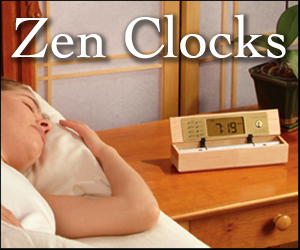 trouble waking up? Worry No More…
Boulder, Colorado—an innovative company has taken one of life’s most unpleasant experiences (being startled awake by your alarm clock early Monday morning), and transformed it into something to actually look forward to.
“The Zen Alarm Clock,” uses soothing acoustic chimes that awaken users gently and gradually, making waking up a real pleasure. Rather than an artificial recorded sound played through a speaker, the Zen Clock features an alloy chime bar similar to a wind chime. When the clock’s alarm is triggered, its chime produces a long-resonating, beautiful acoustic tone reminiscent of a temple gong. Then, as the ring tone gradually fades away, the clock remains silent until it automatically strikes again three minutes later. The frequency of the chime strikes gradually increase over ten-minutes, eventually striking every five seconds, so they are guaranteed to wake up even the heaviest sleeper. This gentle, ten-minute “progressive awakening” leaves users feeling less groggy, and even helps with dream recall.
 waking up happy Now & Zen’s Chime Alarm Clock Store
1638 Pearl Street
Boulder, CO 80302
(800) 779-6383
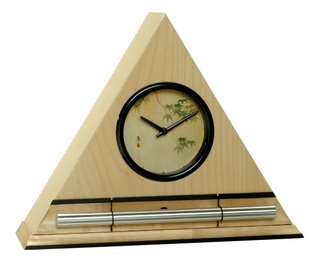 Peaceful Wake Up Chime Alarm Clocks
Posted in Natural Awakening, sleep, Sleep Habits
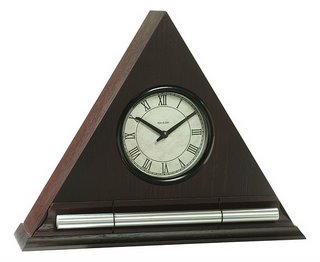 Just Say No to a Snooze Button, use a Zen Clock Just Say No to a Snooze Button
Most modern alarm clocks include a “snooze button” mechanism which allows the user to go back to sleep for a brief period after the initial alarm.
While this may make it easier for some people to “face the day,” here at Now & Zen we feel the whole concept of a snooze button is “all wrong.”
People want snooze buttons because they want to awaken gradually. And this is only natural because just as our bodies fall asleep gradually, our bodies also want to wake up gradually. However, with a regular, snooze button-equipped alarm clock the user is initially “startled awake” by the alarm, and then continually startled awake with each press of the snooze button. This is not the way to treat your body because it creates a kind of merry-go-round of multiple “rude awakenings.”
As an alternative we recommend using our Zen Alarm Clock, which wakes users gradually with a built-in 10 minute progression of gradually increasing acoustic chimes. It really is a better way to get up in the morning.
Zen Alarm Clocks make waking up a beautiful experience. And once you experience the Zen Clock’s gradual 10 minute chime progression, you will never want to wake up any other way again.
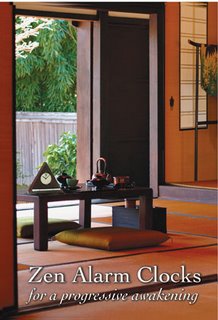 Zen Clocks are an Alternative to Snooze Button Clocks that Shorten Your Life! Now & Zen
1638 Pearl Street
Boulder, CO 80302
(800) 779-6383
Posted in Natural Awakening, sleep, Sleep Habits, wake up alarm clock
The alarm clock violently assaults us when we’re helpless. But there are more gentle ways to go from dream-time to waking.
BY: Sarvananda Bluestone
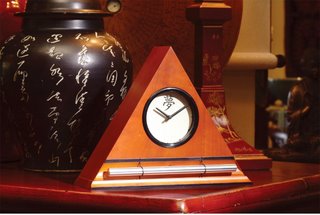 gentle, soothing zen alarm clock How would you feel about waking every day to a siren sounding in your bedroom? Or how about the crashing of cymbals right next to your head? This is the stuff of nightmares. Yet it is not that far removed from most folks’ actual morning experience.
Take alarm clocks. Please. Their very name indicates their primary quality. They frighten, startle, warn, or shock us into wakefulness. And they take several forms. I once had an old-fashioned alarm clock, the kind with two brass bells and a hammer that struck both bells with infuriating speed, creating a metallic cacophony that could wake the dead. There are electric alarms that buzz with ever-increasing loudness. There are radio alarms that blare out early morning news, commercials, or random music. And on and on.
The alarm clock is a form of violence. It jars us at the time when we are most vulnerable and helpless. Sometimes we respond in kind. My childhood friend, Guy, had a collection of guns. When his clanging alarm clock went off one morning, he threw it out the window and shot it with his rifle.
We in the West have been shocking ourselves into wakefulness for a long time. It has not always been like this, however. For thousands of years people have paid more attention to how they awaken and are awakened.
In many cultures, it is believed that the soul travels when we are asleep. Thus, it is very important that the sleeper is brought gently to wakefulness so that his or her soul might find its way back. For traditional peoples around the world, this is a matter of life and death.
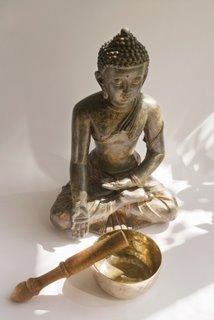 Carved Wooden Thai Buddha with Singing Bowl The Havasupai of the American southwest felt that there was a delicate thread between the night-traveling soul and the body of the dreamer and that any sudden awakening might cut the thread and prevent the soul from returning to the body. The Xingu people of central Brazil similarly aver that sudden waking prevents the soul from returning to the body. In Africa, the Azande and Masai peoples both caution against waking a person suddenly–an aggressive awakening may lead to death. In Japan, too, the Ainu call for waking people slowly to allow the soul and body to reunite, as do the Bororo Indians of Brazil, the Toradja of Sulawesi in Indonesia, and the Andaman Islanders of the Pacific.
Since the method of awakening is so important, many cultures have developed etiquette around it. The Maori of New Zealand consider it a breach of manners to awaken a guest. If, however, it becomes necessary, the host will begin in soft, low tones and increase gradually in volume until the visitor is awake. This gives the spirit time to return to the body. The Kol people of central India and Murngin people Australia follow a similar waking routine.
Of course, we know that people awaken suddenly every day and do not die. But to dismiss the experiences of innumerable other civilizations out of hand would be to miss the point. It is clear that something gets lost when we are awakened sharply and suddenly. It is our dream consciousness that loses its way back to the waking state.
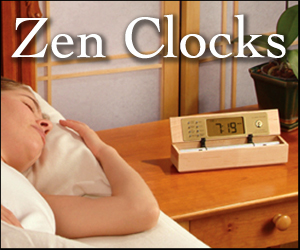 zen alarm clock for a gentle awakening It seems that only in the West do people have difficulty recalling their dreams. Only in the West is there such a thick wall between our dream consciousness and waking consciousness. Part of this is due to the way we, unlike other cultures, undervalue the importance of dream consciousness other than in the psychotherapeutic context. The other reason is that the alarm shocks us out of the dream state and into our rational minds. Our dreams simply don’t have a chance to catch up.
There are, of course, historical reasons for this morning dream death. There is a context to the alarm clock.When the steel and textile mills of the early Industrial Revolution drew in the farmers of the countryside, the clock was the ruler. Time was money. No longer was work driven by the seasons. Instead it was divided into measurable units of time, and the clock became the final arbiter. It was the factory whistle, not the rising of the sun, which moved the people to work. And the alarm clock replaced the rooster.
Our lives today are still dictated by the clock. We don’t even think about it. Train and plane schedules, television and movie programs, restaurant reservations, school, doctor and dentist appointments are all clock-driven.
But what about dream time—that delicate different reality? Dream consciousness is a shy consciousness. It won’t stand being shaken or abused. It simply vanishes.
Alarms are connected with danger and for good reason. They are used in all kinds of disaster situations: burglary, fire, air raid. In their small but significant way, alarm clocks may well have contributed their part to our culture of fear.
Waking Me Softly
There are, however, small islands of hope. Natural and gentle ways of awakening are available and gaining popularity. Intention is the most important ingredient in waking up peacefully. The less we want to get up, the more difficult it will be. But clanging sirens are not the answer. Below are some less alarming possibilities.
Chime Clocks: These quiet, old-fashioned clocks move the sleeper into wakefulness with a softer sound than an alarm buzzer.
Zen Clocks: Gentle Tibetan bell-like chimes strike once, then again 3-1/2 minutes later. The chimes become more frequent over 10 minutes, eventually striking every 5 seconds until you shut it off. They also come in a digital style and in a brass-bowl version with a series of subtle gongs.
 soothing zen alarm clocks by Now & Zen, Inc. Good Morning, Sunshine: Studies by the National Institutes of Health show that waking to light can help people with Seasonal Affective Disorder, certain forms of depression, and sleep disorders. This clock has a built-in light that fades in from zero to full intensity over selected time intervals.
Kids and Pets: For those of us fortunate to have young children or pets in the household, there is a ready-made wake-up service. The hugs of a toddler or nuzzling of a dog are preferable to electronic buzzing. Starting around age three, you might even enlist the child in the service of waking you. You can tell her to shake you gently or speak to you softly or even just to stand there looking at you. If you approach it as a game, the kids are in.
Morning Sounds: In the city or the country, the sounds of the morning world are those that you can anticipate and can help you to awaken softly. Consciously tune in to these. In the country, the birds are the first to welcome the day. And of course, if you live near a rooster, you have a built-in waker-upper. If you live in the city, the sounds of morning are legion—cars and buses rev up, neighbors slam doors, or someone upstairs starts the shower. Learn what these morning sounds are. Select those that are regular and expect them. These are the ones that can serve you daily.
Your Stereo: Most stereo systems can act as timers. Use the CD changer and pick a piece of music that is soothing. Picking a frantic percussion riff or heavy metal cut definitely defeats the purpose. Set the system for the time you want to wake up. Radios aren’t so great for this. We have no idea what’s going to be played. And waking to talk is disconcerting.
 use your inner alarm clock Your Inner Clock: Most of us are so conditioned to the clock that we don’t even need alarm clocks to wake up at a specific time. Here’s how to wean yourself from reliance on the clock.
- Tell yourself that you will wake up before the alarm. You can set your clock, but at bedtime, instruct yourself to wake up before it goes off.
- On a non-working day, try waking without an alarm at all. Just tell yourself that you are going to wake up at a certain time.
- Alternate days. Use an alarm clock every other day. Use your own inner alarm on the other day.
- Keep a record of how you feel on the alarm clock days vs. non-alarm clock days. Any connection between the alarm and getting up on the wrong or right side of the bed?
- Compare how well you remember your dreams on the alarm vs. no-alarm days. Is there any difference at all?
There are probably hundreds, if not thousands, of non-alarming ways to awaken. Perhaps we may someday all move gently from that good night into the world of waking consciousness.
Now & Zen Headquarter Store
1638 Pearl St.
Boulder, CO 80302
(800) 779-6383
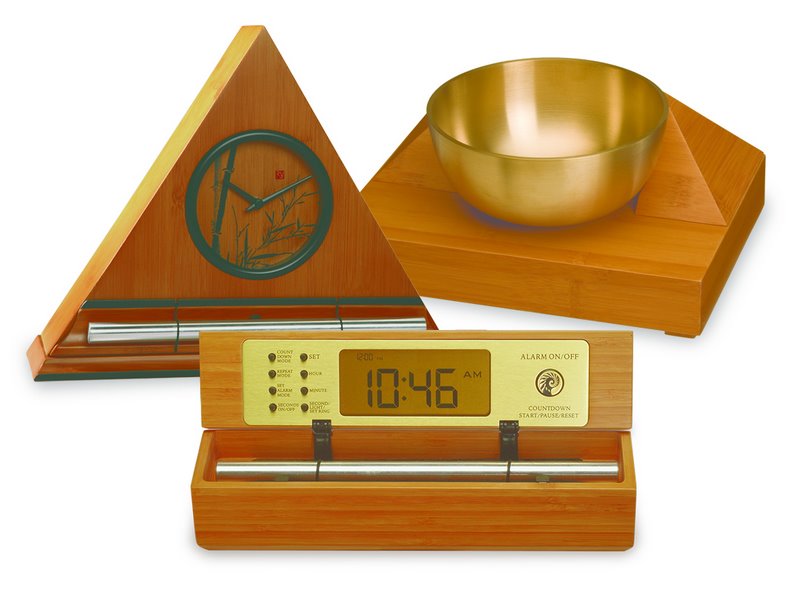 Gentle Alarm Clocks, don't be alarmed!
Posted in Bamboo Chime Clocks, Chime Alarm Clocks, sleep, Sleep Habits
 sleep Studies have found that regular exposure to traffic noise raises blood pressure and may increase the risk of heart disease and stroke, and that nighttime traffic noise interrupts sleep and impairs physical performance in the morning. While you can’t reroute the highway or move to the sticks, you can make a concerted effort to close windows, turn off the TV and the stereo, put on a fan or other white noise machine, and create as much serenity in your bedroom as possible before you go to bed. If there’s no way to block out the sounds of cars whizzing by, consider using earplugs.
adapted from wholeliving.com, Oct. 2011
One of the ultimate Zen like experiences is waking-up from a great slumber refreshed and energized. Your mind and body are harmoniously one, both alert and focused. Having a refreshed mind and body are two keys to a natural and Zen lifestyle. Waking up in the morning should not be a loud and abrupt awakening, but rather it should be a peaceful positive experience. The right natural alarm clock can transition your deep and tranquil sleep into a serene start to consciousness. Imagine a long-resonating Tibetan bell-like chime waking you up to a beautiful morning experience.
The right alarm clock can be the most beneficial investment for you. With our Now & Zen natural alarm clock you are awakened more gradually and thus more naturally. Now & Zen is focused on creating a naturalistic lifestyle, and our clocks are an example of our philosophy.
 zen alarm clock Now & Zen – The Gradual Alarm Clock Store
1638 Pearl Street
Boulder, CO 80302
(800) 779-6383
Posted in sleep, Sleep Habits
 the link between sleeping and weight Not sleeping enough can do more than make you groggy the next day. It can also take a serious toll on your health—starting with your weight.
In the past several years, medical experts have confirmed a link between lack of sleep and weight problems, and a new study from the University of Chicago and the University of Wisconsin-Madison confirms this. Researchers conducted their study on two groups of overweight people. The first group slept for only five and a half hours each night, and the second group slept for eight and a half hours each night. The study found that while both groups lost weight, those who slept longer burned more fat, while those who slept less burned more muscle mass.
In an interview with NPR, sleep medicine expert Dr. Michael Lacey of the Atlanta Sleep Medicine Clinic explained that lack of sleep not only decreases metabolism, but also interferes with the body’s natural production of the hormones ghrelin and leptin, which regulate appetite and satiation. Too little sleep causes the body to produce too much ghrelin, which makes you feel hungry, and not enough leptin, which makes you feel satiated or full. Staying awake longer than you should will make you feel hungry when you’re really not, and will lead you to eat at times you normally wouldn’t. The longer you stay awake, the more tempted you’ll be to snack, too. To make matters worse, most people staying awake too long reach for high-carb or sugary foods, which they’re unlikely to burn off in the wee hours of the night.
Getting enough sleep will help your body burn fat and regulate weight. But how much is the right amount to get? Most sleep experts pinpoint seven to seven and a half hours as the magic sleep number. Sleep fewer than seven hours and you run the risk of fatigue and weight problems. Sleep too much and you put yourself at risk for cardiovascular disease.
adapted from Natural Home Magazine, October 2010 by Susan Melgren
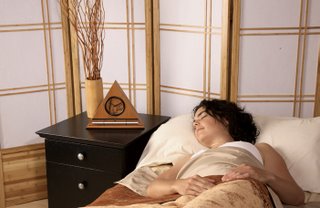 gentle alarm clock, for a slow wake-up
Now & Zen
1638 Pearl Street
Boulder, CO 80302
(800) 779-6383
Posted in Chime Alarm Clocks, sleep, Sleep Habits, wake up alarm clock, Well-being, Zen Alarm Clock
 Brew Sleep-inducing Tea for a Good Nights Rest For occasional insomnia, the following herbs and supplements (found at natural-food stores) may be especially effective. Be sure to discuss supplements you’re interested in with your health-care practicer.
Sleep-Inducing Tea
For a relaxing bedtime beverage, Yance suggests combining several herbs as follows: Passionflower and skullcap soothe agitated nervous systems and can help with mental chatter; oat seed strengthens the nervous system and helps people who are too tired to sleep; and chamomile provides a gently relaxing base.
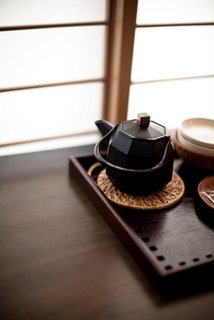 Brew tea to help you sleep
1 chamomile tea bag
30 to 60 drops passionflower tincture
15 to 30 drops skullcap tincture
15 to 30 drops milky oat seed (Avena sativa) tincture
Set your Zen Timer with Chime for 5 minutes. Pour boiling water over tea bag and let steep for five minutes. Remove tea bag, and add drops of tincture to tea. Stir in a touch of honey if desired. Sip and enjoy.
adapted from Body + Soul Magazine, May 2008 by Sarah Schmelling
 Chime Timers in Bamboo with Natural Acoustic Chimes for Brewing Tea
Now & Zen
1638 Pearl Street
Boulder, CO 80302
(800) 779-6383
Posted in Insomnia, sleep, Sleep Habits
 Set your Zen Alarm Clock at Night Today, in our too-fast, information-overloaded society, we’ve lost much of our connection to the Earth, to spirit, to nature’s cycles, to our own cycles. And yet, we still need things to feed us, to ground us, to give us courage and connection.
Good rituals are essential to our emotional, psychological, and spiritual health. To help reconnect us to the sacred aspects of our lives, we asked an expert to share everyday rituals that they’ve created or practice.
Sleep Practice
Bedtime is when we drop our defenses and become vulnerable. This is why most religions have a tradition of bedtime prayers, says Alexander. Today, she believes, most insomnia and disturbed nights are caused by overactive minds mulling over the day’s problems.
 chime alarm clock for a peaceful sleep
Intention
To mark the break from day to night and ease into a state of physical and mental relaxation.
Materials
Lavender oil, notebook, and writing utensil.
Steps
1. Change (or bathe) with intention. As you take off your clothes, visualize all your daytime anxieties and concerns dropping away. As you wash, imagine that you cleanse away all the negativity of the day.
2. Write down all the positive things that happened during your day.
3. Dab the Lavender oil on a handkerchief and place it near the bed. Lie down, breathe in the soothing scent of the oil, and cast your mind back over the day without judgment.
4. Set your Zen Alarm Clock to the time you need to wake up in the morning right before you go to bed. Use your Zen alarm clock to not only wake you up gradually in the morning, but as a blocker of all negativity. When your alarm clock is set, don’t think about your problems or agenda for tomorrow; instead concentrate on your breathing so you fall asleep peacefully.
Now & Zen Alarm Clocks has adapted this from Body + Soul Magazine
 Chime Alarm Clock For a Progressive Awakening Now & Zen
1638 Pearl Street
Boulder, CO 80302
(800) 779-6383
Posted in Chime Alarm Clocks, intention, mindfulness practice, Now & Zen Alarm Clocks, Progressive Awakening, sleep, Sleep Habits, wake up alarm clock, Well-being
« Previous Page — « Previous Entries
Next Entries » — Next Page »
|
|
|
|